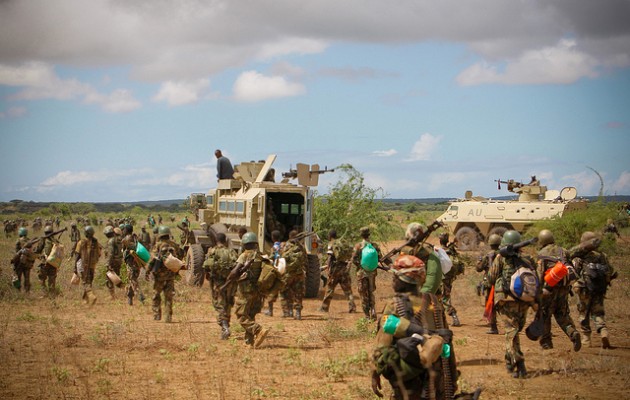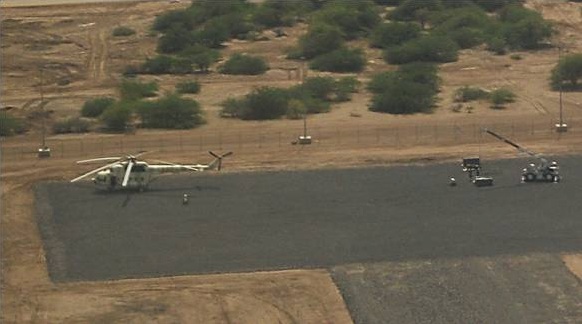Bureau of Investigative Journalism
Monday, September 24, 2012

African Union troops advance on Al Shabaab positions, May 2012 (AU/ UN IST/ Stuart Price)
The Somali government has given free rein to international forces including the US and African Union to act with impunity in the country, a number of sources have told the Bureau.
During the country’s two decades of conflict, its frail government invited numerous outside forces in to help fight threats such as the al Shabaab Islamic militant movement.
The country is now making tentative steps towards recovery, and recently held its first elections in 21 years. But its newly elected parliamentarians have little or no authority over the numerous foreign forces that still remain in the country.
‘The Somali government is in no position whatsoever to question the soldier that is standing at the gate of the presidential palace defending him from the attack from al Shabaab,’ said Omar Jamal, a diplomat with the Somali mission to the UN, in an interview with the Bureau.
‘Whoever comes trying to help them defeat al Shabaab, they are more than welcome… [but] they are given a licence to completely ignore any local or international law,’ he added.
It’s not even clear which foreign forces are currently serving in Somalia, the terms of their involvement, and what they are doing. The Bureau has examined UN documents and spoken to numerous individuals with knowledge of the situation to try and untangle who is doing what.
The US in Somalia
The striking thing that emerges is the extent of the US’s involvement in Somalia, both direct and indirect. The US has carried out covert operations in the country since just after the September 2001 attacks, and according to the Bureau’s own monitoring continues to do so.
The United States has around 2,500 military personnel in the Horn of Africa region. It has provided support to international bodies and, it is alleged, to invading armies. And the US company formerly known as Blackwater is involved in a controversial ‘counter-piracy’ force that has been criticised by the UN.
But the US is far from the only external actor in Somalia.
African Union troops
The African Union Mission in Somalia – Amisom – was set up for peacekeeping in the war-torn state. Its 16,500 strong peacekeeping force comes mostly from Uganda, Burundi and Kenya.
It is backed by the US: Amisom’s troops were trained and equipped by the Pentagon and State Department for ‘a pittance’ of just $700,000 (£432,000) over four years, according to the Los Angeles Times.
‘Through Amisom ‘the Obama administration is trying to achieve US military goals with minimal risk of American deaths and scant public debate,’ opined the paper.
Amisom member
|
Contribution (number of soldiers) |
| Uganda |
6,400 |
| Burundi |
5,400 |
| Kenya |
4,664 |
| Djibouti |
35 deployed from 1,000 committed |
| Sierra Leone |
0 deployed from 1,000 committed |
Ethiopia
Forces from neighbouring Ethiopia crossed over to Somalia with US backing in December 2006 after the Somalia Transitional Federal Government (TFG) was ousted from power by Islamists. The Ethiopians then invaded again in 2011.
How many Ethiopian troops are still in the country is a mystery, although their forces are currently reported to be involved in an advance on Kismayo, a deep water port and the last stronghold of al Shabaab.
‘To be honest, no one knows,’ said EJ Hogendoorn from the International Crisis Group. ‘My guess is it’s definitely in the order of thousands.’
Eritrea also stands implicated in providing support for militant groups. And Kenyan aircraft have reportedly taken part in operations. In addition, off Somalia’s coast naval forces from the European Union and up to 20 other nations operate, primarily engaged in anti-piracy operations but also in counter-terrorism work.
With so many foreign nations militarily engaged in Somalia the TFG was effectively powerless according to Somali diplomat Jamal: ‘The Somali government is put in a position, is forced in a position, where they have to accept everything that comes to them… (They) exercise with impunity what they want to do under the auspices of fighting terrorism’.
UN monitoring
In an effort to control this militarisation, an arms embargo imposed by the UN seeks to limit the flow of weapons into the country. But sanctions can only be applied to individuals and ‘non state actors’ such as al Shabaab. Nations states and Amisom are exempt.
Matt Bryden, who headed the United Nations’ Somalia and Eritrea Monitoring Group until recently, is critical of aspects of the embargo.
‘Technical assistance in support of Amisom and its mission benefits from an automatic exemption,’ Bryden told the Bureau. This means that ’anyone can say anything they are doing in Mogadishu or Somalia is in support of Amisom.’
States do not have to notify the Security Council of their support for Amisom beforehand, leaving the monitoring group chasing shadows.
‘If we identify foreign fighters on the ground, foreign forces, and someone says “Oh, they’re in support of Amisom,” how do we know that?’ he continues. ‘We can talk to Amisom but it’s all very time-consuming and some of the missions are more sensitive than others.’
Despite the 20-year ban on weapon sales, the monitoring group report admits that ‘the pattern of arms embargo violations in Somalia has changed little over previous years.’ The arms markets of Yemen continue to supply Somalia’s militants and militias with guns and ammunition.
Secret US war
As the Bureau’s own monitoring shows, US Special Forces have also been carrying out covert operations in Somalia since just after 9/11.
From 2007 elite troops from the Pentagon’s Joint Special Operations Command (JSOC) took advantage of Ethiopia’s invasion to carry out a number of targeted killings. In 2011, US armed drones also began operating in the failed state. The Bureau has recorded at least 10 US combat operations in Somalia in the past five years.
In addition, the CIA has a major presence in the country. According to US investigative journalist Jeremy Scahill, they operate a secret detention facility at Mogadishu airport. And the UN monitoring group’s most recent findings suggest a far higher level of US military activity in Somalia than is currently being reported.
Credibel news agenecies reported 12 air operations over Somalia between June 2011 and April 2012. But in the same period UN monitors (PDF) recorded 64 unauthorised flights over the country. Most of these were Kenyan air strikes in southern Somalia. But almost a quarter of the flights were either US drones or ‘unidentified’ aircraft.
On at least two occasions drones were ‘employed in targeted assassination of al Shabaab leaders and commanders.’

The UN report shows a Russian-made Mi-17 helicopters at Camp Lemonier, a US base in Djibouti.
The monitors also exposed the existence of four unarmed and unmarked ‘CIA helicopters’ which the report says are used to ferry troops into Puntland from a base in neighbouring Djibouti. The UN even published a picture of the aircraft.
Alongside the CIA helicopters, private contractors hired by the US flew ‘sixty-five flights to Puntland between August 2011 and March 2012’ adds the report. The monitors believe these were in support of the Somali security services, and ‘the US confirmed that on one occasion’ adds Bryden.
The full extent of these operations remains a mystery. Despite spending seven months on the ground, the monitors’ study is limited by what its researchers could uncover.
Bryden says, ‘the vast majority of surveillance flights, whether operated by drones or manned aircraft, are not declared to civil aviation authorities and go undetected from the ground.’
‘There is a lot more going on,’ Bryden continues. He estimates that the report as a whole may only be capturing half of the picture.
‘Private army’
More controversially, the UN report raised concerns about what it says is the funding of a private military force for the president of Puntland, a semi-autonomous region of Somalia.
According to the report, the Puntland Maritime Police Force (PMPF) has been ‘disingenuously labelled a ‘counter-piracy’ force.’
Rather, it is ‘an elite force outside any legal framework, engaged principally in internal security operations, and answerable only to the Puntland presidency.’
Training for the PMPF was ‘established in May 2010, with the initial involvement of Erik Dean Prince, the American founder of Blackwater USA’, the report continues. Blackwater is a controversial private security firm which has twice been renamed, first as Xe Services and now as Academi.
The report (PDF) brands the ‘externally financed assistance programme’ to train the PMPF as ‘the most brazen violation of the arms embargo by a private security company.’
According to Matt Bryden some of those involved ‘lawyered up’ in response to this criticism. Among the attorneys he says they engaged is Stephen Heifetz (PDF), an ex-CIA legal officer.
Heifetz rejects the monitors’ report, directing the Bureau to a letter sent to Ambassador Hardeep Singh Puri, chairman of the Security Council committee for Somalia. In it Heifitz says that the monitors’ allegations about his client SCS are ‘not only false but outrageous and even vindictive.’
The report’s conclusions, the letter states, are ‘absurd and suggests a deliberate disregard for the facts.’
The PMPF project was not only ‘UN-mandated, transparent and internationally supported,’ Heifetz adds, but legal and consistent with other programmes catalogued by the UN monitoring group. ‘SCS personnel at all times acted with the financial support of the UAE… and the political support of the TFG,’ he continued.
Bryden says that neither SCS nor key individuals training the PMPF are on a sanctions list, despite the operation running for two years. The monitors recommended that the Security Council ‘proceed without delay’ in doing so now. And ‘if it doesn’t happen,’ says Bryden, ‘then I think it shows the sanctions regime to be toothless.’
Some, however, have accused Bryden himself of bias. Somalia’s Transitional Federal Government expressed ‘great concern’ to the Security Council, describing parts of the report as ‘akin to the proverbial witch-hunt.’ And the government of the United Arab Emirates has denied claims that it has funded the PMPF (although this has been contradicted by Heifetz). Puntland’s president could not be reached for comment by the Bureau.
With any new Somalia government possibly tainted by claims of illegitimacy – and still dependent on foreign military intervention – US operations within Somalia are likely to stay in the shadows for some time to come.